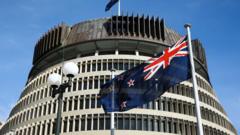The speaker of the house in New Zealand's parliament has declared that he will not entertain further complaints regarding the use of the country's Māori name, Aotearoa, in parliamentary discussions. This statement by Speaker Gerry Brownlee was made during a ruling in Parliament on Tuesday. The ruling follows an objection from Deputy Prime Minister Winston Peters, who requested that the use of Aotearoa be restricted unless a referendum is held.
Although New Zealand is the nation’s legal name, Aotearoa, meaning "land of the long white cloud," has been frequently employed to refer to the country in Māori traditions. Brownlee pointed out that Aotearoa appears on passports and currency, emphasizing its recognition within the nation’s framework. "If other members do not like certain words, they don't have to use them," Brownlee concluded, asserting that further points of order on the matter are unwarranted.
The discussion was ignited last month when Green MP Ricardo Menéndez March used Aotearoa in a parliamentary session. Peters questioned why a recent migrant was allowed to alter the country's name without a referendum while expressing his discontent. "Why is someone who applied to come to this country in 2006 allowed to ask a question of this Parliament that changes this country's name without the referendum and sanction of the New Zealand people?" he articulated.
Additionally, Shane Jones, a colleague in Peters' New Zealand First party, indicated that it is inappropriate for new immigrants to dictate the name of a country with deep Māori significance. Brownlee had previously suggested using the term Aotearoa New Zealand for clarity, though it remains a matter of personal choice.
The meaning and connection of Aotearoa differ among Māori, as it originally described only New Zealand's North Island. Nevertheless, many non-Māori have adopted the name out of respect for indigenous culture. Peters has made his stance clear, stating he disagrees with Brownlee's position and will refuse to engage with questions posed using Aotearoa in Parliament.
The visibility and acceptance of Māori language have expanded significantly in New Zealand over the past few decades due to the advocacy by indigenous leaders. A petition initiated by the Māori Party to officially rename the country Aotearoa garnered over 70,000 signatures. Māori Party Co-leader Rawiri Waititi remarked, "New Zealand is a Dutch name and has no connection to this whenua [land]."
Following the current government's 2023 mandate, departments are advised to prioritize English in their communications unless it pertains specifically to Māori issues. Additionally, the Act party is proposing a redefinition of the terms in New Zealand's foundational document, the Treaty of Waitangi, which has sparked substantial opposition among various groups.



















